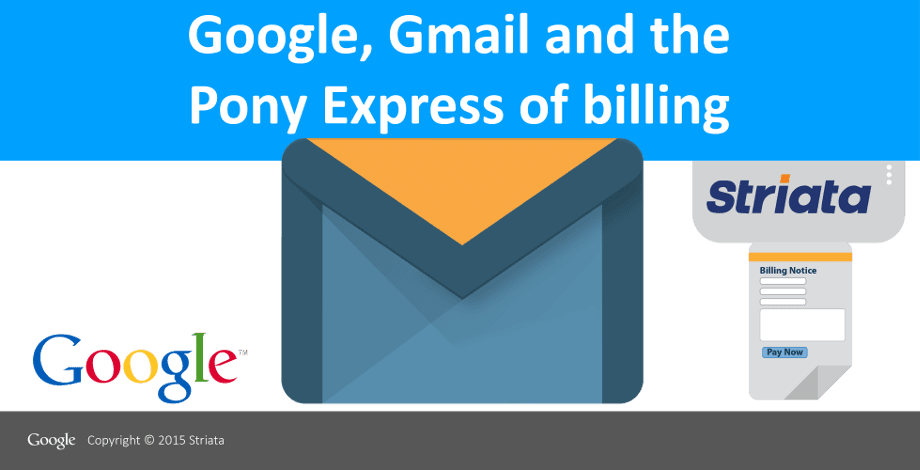
“Google is working on an offering for the electronic billing market,” so says Re/code in a review of a confidential document they had access to.
Dubbed ‘Pony Express’ for now, it is a service that allows customers to receive and pay their bills within the Gmail interface.
“I told you so” must be one of the most satisfying comments for most people. However in this case “I saw it coming” would be more accurate.
In my February 2013 post entitled, “Google, Digital Mailboxes and the long tail of billing” I was certain that it was just a matter of time before Google actively targeted the eBilling market.
Having re-read the post, most of the hypothesis’ hold true and are in-line with the Re/code article and industry commentary thereon. (See InfoTrends’ Matt Swain’s commentary here). However there are some notable business processes that are not clear as yet.
How will it work?
How the data will get from the biller to Gmail is a crucial element in making this work. If this is done according to a predefined data specification (probably a tailored existing XML framework), then how will businesses react to having to create another output stream for just one provider (and a small subset of their customer base to start)?
How I think it should work…
In my view, the simplest way to start would be for billers to sign-up to the service and receive a token. This would then be added to the headers of an emailed bill. In doing this (using SPF and DKIM plus the token), Gmail would be able to classify an incoming eBill as a legitimate bill and insert it into the billing interface accordingly.
The long tail of billing dictates that for each business to have to create and send a data file to Gmail would be a gargantuan task that only addresses part of their customer base. It is much simpler to send emails to every customer and those that happen to be Gmail receive special treatment in the Gmail interface based on the token above.
Indeed the downfall of digital mailbox companies such as Zumbox and Manilla was the “catch-22” of not enough customers to attract enough billers to attract enough customers. There is significant work to be done within a business to create a new output file in a new format. At Striata we see this everyday when we engage a customer’s IT department to deliver data to us. Within our process we address the entire customer base (everyone with an email address) and hence the effort is worthwhile in terms of paper turn-off and cost savings. In the Gmail space, although they have an enormous share of the inbox market, it will only address a subset of customers with Gmail email addresses.
Come on Google – open it up to everyone – accept emailed bill attachments from registered billers – there has to be a business model in that for you and it could be the “better mousetrap” for the eBilling industry that everyone has been waiting for.
I am interested to hear your opinion – if you are a Biller, then please share your thoughts on how you plan to jump on Google’s ‘pony express’ ?
Improve the customer experience with secure document delivery today















